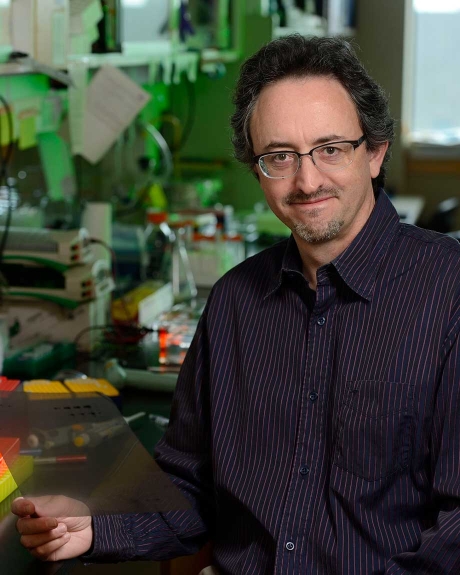
Joel L. Pomerantz
Mechanisms of signaling in immunity and cancer
-
Academic Program Finder
-
Master's Degrees
- MSPH in Population, Family and Reproductive Health
- Master of Applied Science (MAS) in Patient Safety and Healthcare Quality
- Master of Applied Science (MAS) in Population Health Management
- Master of Applied Science (MAS) in Spatial Analysis for Public Health
- Master of Arts and Master of Science in Public Health (MA/MSPH)
- Master of Arts in Public Health Biology (MAPHB)
- Master of Bioethics (MBE)
- Master of Health Administration (MHA)
- Master of Health Science (MHS) - Department of Biochemistry and Molecular Biology
- Master of Health Science (MHS) - Department of Epidemiology
- Master of Health Science (MHS) - Department of Mental Health
- Master of Health Science (MHS) - Department of Molecular Microbiology and Immunology
- Master of Health Science (MHS) in Health Economics and Outcomes Research
- Master of Health Science (MHS) in Health, Behavior and Society
- Master of Health Science (MHS)
- Master of Health Science - Department of Biostatistics
- Master of Health Science - Department of Population, Family and Reproductive Health
- Master of Health Science in Global Health Economics
- Master of Public Health (MPH)
- Master of Science (ScM) - Department of Biochemistry and Molecular Biology
- Master of Science (ScM) - Department of Biostatistics
- Master of Science (ScM) - Department of Epidemiology
- Master of Science (ScM) - Department of Molecular Microbiology and Immunology
- Master of Science (ScM) in Genetic Counseling
- Master of Science in Public Health (MSPH) in Health Education and Health Communication
- Master of Science in Public Health (MSPH) in Health Policy
-
Master of Science in Public Health - Department of International Health
- Master of Science in Public Health (MSPH) in Global Disease Epidemiology and Control
- Master of Science in Public Health (MSPH) in Health Systems
- Master of Science in Public Health (MSPH) in Human Nutrition
- Master of Science In Public Health (MSPH) In Human Nutrition – Dietitian
- Master of Science in Public Health (MSPH) in Social and Behavioral Interventions
-
Doctoral Degrees
- Doctor of Philosophy (PhD) - Department of Biochemistry and Molecular Biology
- Doctor of Philosophy (PhD) - Department of Biostatistics
- Doctor of Philosophy (PhD) - Department of Epidemiology
- Doctor of Philosophy (PhD) - Department of Mental Health
- Doctor of Philosophy (PhD) - Department of Molecular Microbiology and Immunology
- Doctor of Philosophy (PhD) - Department of Population, Family and Reproductive Health
- Doctor of Philosophy (PhD) in Clinical Investigation
- Doctor of Philosophy (PhD) in Health Policy and Management
- Doctor of Philosophy (PhD) in Social and Behavioral Sciences
- Doctor of Philosophy - Department of International Health
- JHU-Tsinghua Doctor of Public Health
- Doctor of Public Health (DrPH)
- Combined / Dual Degrees
-
Certificate Programs
- Adolescent Health Certificate Program
- Bioethics Certificate Program
- Clinical Trials Certificate Program
- Community- Based Public Health Certificate Program
- Demographic Methods Certificate Program
- Epidemiology for Public Health Professionals Certificate Program
- Evaluation: International Health Programs Certificate Program
- Frequently Asked Questions for Certificate Programs
- Gender and Health Certificate Program
- Gerontology Certificate Program
- Global Digital Health Certificate Program
- Global Health Certificate Program
- Global Health Practice Certificate Program
- Health Communication Certificate Program
- Health Disparities and Health Inequality Certificate Program
- Health Education Certificate Program
- Health Finance and Management Certificate Program
- Healthcare Epidemiology and Infection Prevention and Control Certificate Program
- Humanitarian Health Certificate Program
- Implementation Science and Research Practice Certificate Program
- Injury and Violence Prevention Certificate Program
- Leadership for Public Health and Healthcare Certificate Program
- Lesbian, Gay, Bisexual, Transgender, and Queer (LGBTQ) Public Health Certificate Program
- Maternal and Child Health Certificate Program
- Mental Health Policy, Economics and Services Certificate Program
- Non-Degree Students General Admissions Info
- Pharmacoepidemiology and Drug Safety Certificate Program
- Population Health Management Certificate Program
- Population and Health Certificate Program
- Public Health Advocacy Certificate Program
- Public Health Economics Certificate Program
- Public Health Informatics Certificate Program
- Public Health Training Certificate for American Indian Health Professionals
- Public Health, Human Rights, and the Law Certificate Program
- Public Mental Health Research Certificate Program
- Quality, Patient Safety and Outcomes Research Certificate Program
- Requirements for Successful Completion of a Certificate Program
- Rigor, Reproducibility, and Responsibility in Scientific Practice Certificate Program
- Risk Sciences and Public Policy Certificate Program
- Social Epidemiology Certificate Program
- Spatial Analysis for Public Health Certificate Program
- Training Certificate in Public Health
- Tropical Medicine Certificate Program
- Tuition for Certificate Programs
- Vaccine Science and Policy Certificate Program
- Online Programs
- Accelerated Learning Institutes
- Postdoctoral Programs
- Residency Programs
- Graduate Training Programs in Clinical Investigation
- For Working Professionals
-
Training Grants
-
Mixed Methods Research Training Program for the Health Sciences
- About the Program
- Announcements
- Application Process
- Contact Us
-
Current Scholars
-
2015 Scholars
- Jennifer I Manuel, PhD, MSW
- Joke Bradt, PhD
- Josiemer Mattei, PhD, MPH
- Justin Sanders, MD, MSc
- Linda Charmaran, PhD
- Nao Hagiwara, PhD
- Nynikka R. A. Palmer, DrPH, MPH
- Olayinka O. Shiyanbola, BPharm, PhD
- Sarah Ronis, MD, MPH
- Susan D. Brown, PhD
- Tara Lagu, MD, MPH
- Theresa Hoft, PhD
- Wynne E. Norton, PhD
- Yvonne Mensa-Wilmot, PhD, MPH
-
2016 Scholars
- A. Susana Ramírez, PhD, MPH
- Animesh Sabnis, MD, MSHS
- Autumn Kieber-Emmons, MD, MPH
- Benjamin Han, MD, MPH
- Brooke A. Levandowski, PhD, MPA
- Camille R. Quinn, PhD, AM, LCSW
- Justine Wu, MD, MPH
- Kelly Aschbrenner, PhD
- Kim N. Danforth, ScD, MPH
- Loreto Leiva, PhD
- Marie Brault, PhD
- Mary E. Cooley, PhD, RN, FAAN
- Meganne K. Masko, PhD, MT-BC/L
- PhuongThao D. Le, PhD, MPH
- Rebecca Lobb, ScD, MPH
-
2017 Scholars
- Allegra R. Gordon, ScD MPH
- Anita Misra-Hebert, MD MPH FACP
- Arden M. Morris, MD, MPH
- Caroline Silva, PhD
- Danielle Davidov, PhD
- Hans Oh, PhD
- J. Nicholas Dionne-Odom, PhD RN ACHPN
- Jacqueline Mogle, PhD
- Jammie Hopkins, DrPH, MS
- Joe Glass, PhD MSW
- Karen Whiteman, PhD MSW
- Katie Schultz, PhD MSW
- Rose Molina, MD
- Uriyoán Colón-Ramos, ScD MPA
-
2018 Scholars
- Andrew Riley, PhD
- Byron J. Powell, PhD, LCSW
- Carrie Nieman MD, MPH
- Charles R. Rogers, PhD, MPH, MS, CHES®
- Emily E. Haroz, PhD
- Jennifer Tsui, Ph.D., M.P.H.
- Jessica Magidson, PhD
- Katherine Sanchez, PhD, LCSW
- Kelly Doran, MD, MHS
- Kiara Alvarez, PhD
- LaPrincess C. Brewer, MD, MPH
- Melissa Radey, PhD, MA, MSSW
- Sophia L. Johnson, PharmD, MPH, PhD
- Supriya Gupta Mohile, MD, MS
- Virginia McKay, PhD
-
2019 Scholars
- Andrew Cohen, MD, PhD
- Angela Chen, PhD, PMHNP-BC, RN
- Christopher Salas-Wright, PhD, MSW
- Eliza Park MD, MS
- Jaime M. Hughes, PhD, MPH, MSW
- Johanne Eliacin, PhD, HSPP
- Lingrui Liu ScD MS
- Meaghan Kennedy, MD
- Nicole Stadnick, PhD, MPH
- Paula Aristizabal, MD
- Radhika Sundararajan, MD
- Sara Mamo, AuD, PhD
- Tullika Garg, MD MPH FACS
-
2020 Scholars
- Allison Magnuson, DO
- Ariel Williamson PhD, DBSM
- Benita Bamgbade, PharmD, PhD
- Christopher Woodrell MD
- Hung-Jui (Ray) Tan, MD, MSHPM
- Jasmine Abrams, PhD
- Jose Alejandro Rauh-Hain, MD
- Karen Flórez, DrPH, MPH
- Lavanya Vasudevan, PhD, MPH, CPH
- Maria Garcia, MD, MPH
- Robert Brady, PhD
- Saria Hassan, MD
- Scherezade Mama, DrPH
- Yuan Lu, ScD
- 2021 Scholars
-
2015 Scholars
- Resources
- Sign Up for Our Email List
-
Mixed Methods Research Training Program for the Health Sciences
-
Master's Degrees
- Course Directory
- Academic Calendar
- Hybrid Campus
- Convocation
- Lecture Series
Associate Professor
Department of Biological Chemistry
School of Medicine

Research Overview
My laboratory is interested in the molecular mechanisms by which cells interpret signals from their environment that instruct them to proliferate, differentiate, or die by apoptosis. This process is of fundamental importance in the development and function of the immune system. The dysregulation of signal transduction underlies many diseases of the immune system including immunodeficiencies, autoimmunity, and cancers derived from immune cells.
A particular focus of the lab is the regulation of NF-κB, a pleiotropic transcription factor that is required for normal innate and adaptive immunity and which is inappropriately activated in several types of human cancer. We have been studying how NF-κB is activated in B and T lymphocytes in response to antigen recognition by the T cell receptor (TCR) and B cell receptor (BCR) complexes. Recently we have characterized the molecular mechanisms by which a multi-domain adapter protein, CARD11, functions in TCR signaling to NF-κB. In response to antigen receptor engagement, CARD11 undergoes a transition from an inactive to an active protein scaffold, and recruits a cadre of signaling cofactors into a complex in a signal-responsive manner. Current research is aimed at understanding how the multiple domains of CARD11 function together to translate activating upstream signals from the antigen receptor into the coordinated signaling activity of associated cofactors. CARD11 has also been directly implicated in the dysregulated signaling to NF-κB that is a signature feature of a subtype of Diffuse Large B cell Lymphoma (DLBCL). This subtype of DLBCL requires constitutive NF-κB activation for oncogenic proliferation, and the knockdown of CARD11 in this lymphoma leads to apoptosis. Interestingly, several oncogenic mutations in CARD11 have been identified in human DLBCL.
We are currently studying how the oncogenic CARD11 mutations result in hyperactive signaling to NF-κB. We are hopeful that a mechanistic understanding of these mutants might translate into the development of novel cancer therapeutics. In addition to the antigen receptor signaling pathway, we are also studying the regulation of NF-κB in other arms of the innate and adaptive immune system through the isolation and characterization of novel regulators of NF-κB activity. We have developed several novel expression-cloning approaches for identifying novel signaling molecules that either activate or inhibit NF-κB. Several novel signaling regulators are under current study. Other current projects include the study of novel regulators of the NFAT transcription factor, a key player in T cell activation and tolerance. It is our hope that the study of these signaling molecules will expand our understanding of how inflammatory and immune responses are controlled and they are dysregulated in human disease.
Selected Publications
- Carter NM, Hankore WD, Yang YK, Yang C, Hutcherson SM, Fales W, Ghosh A, Mongia P, Mackinnon S, Brennan A, Leone RD, Pomerantz JL. QRICH1 mediates an intracellular checkpoint for CD8+ T cell activation via the CARD11 signalosome. Science Immunology, 2025.
- Bedsaul JR, Shah N, Hutcherson SM, Pomerantz JL. Mechanistic impact of oligomer poisoning by dominant-negative CARD11 variants. iScience, 2022.
- Hutcherson SM, Bedsaul JR, Pomerantz JL. Pathway-Specific Defects in T, B, and NK Cells and Age-Dependent Development of High IgE in Mice Heterozygous for a CADINS-Associated Dominant NegativeCARD11 Allele. Journal of Immunology, 2021.
- Wang Z, Hutcherson SM, Yang C, Jattani RP, Tritapoe JM, Yang YK, Pomerantz JL. Coordinated regulation of scaffold opening and enzymatic activity during CARD11 signaling. Journal of Biological Chemistry, 2019.
- Dadi H, Jones TA, Merico D, Sharfe N, Ovadia A, Schejter Y, Reid B, Sun M, Vong L, Atkinson A, Lavi S, Pomerantz JL, Roifman CM. Combined immunodeficiency and atopy caused by a dominant negative mutation in caspase activation and recruitment domain family member 11 (CARD11). Journal of Allergy and Clinical Immunology, 2018.
